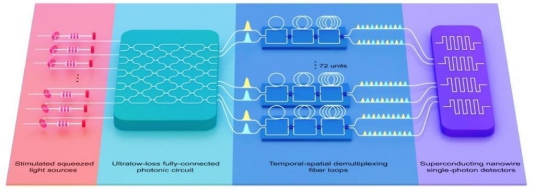beijingwalker
ELITE MEMBER

- Joined
- Nov 4, 2011
- Messages
- 65,191
- Reaction score
- -55
- Country
- Location
Chinese scientists claim record smashing quantum computing breakthrough
- Paper says JiuZhang 3 is a million times faster than its predecessor and light years ahead of the world’s fastest supercomputer
- Researchers say that despite the advance, there is still a long way to go before the technology replaces classical computers
Scientists in China say their latest quantum computer has solved an ultra-complicated mathematical problem within a millionth of a second – more than 20 billion years quicker than the world’s fastest supercomputer could achieve the same task.
The JiuZhang 3 prototype also smashed the record set by its predecessor in the series, with a one million-fold increase in calculation speed, according to a paper published on Tuesday by the peer-reviewed journal Physical Review Letters.
The research team is led by Pan Jianwei, a leading scientist in China’s national quantum research programme, from the University of Science and Technology of China at Hefei, in the eastern province of Anhui.
The first Jiuzhang machine – named after an ancient mathematics textbook – was built by Pan’s team in 2020. The series uses photons – tiny particles that travel at the speed of light – as the physical medium for calculations, with each one carrying a qubit, the basic unit of quantum information.
After increasing the number of photons from 76 to 113 in the first two versions of the machine, respectively, Pan and his team have achieved an advance to 255 in the latest iteration.
The researchers used Jiuzhang 3 to solve a complex problem based on Gaussian boson sampling that simulates the behaviour of light particles passing through a maze of crystals and mirrors.
The task was initially proposed as a physical game without purpose, though some recent studies suggest that boson sampling could have some applications in cryptography.
In the experiment, the research team said Jiuzhang 3 solved a problem with the highest sample complexity, claiming it was able to process the task within one millionth of a second.
The fastest classical supercomputer Frontier – developed in the US and named the world’s most powerful in mid-2022 – would take over 20 billion years to complete the same task, the researchers said.
China, the US and other countries are in a heated race to achieve “quantum supremacy” – the point at which a machine can outperform classical computers, solving problems that are beyond the capabilities of conventional machines.
But they are using different methods to approach the objective, with photonic processors just one of several types of quantum computing.
Also competing with light-based systems is Xanadu, a company based in Toronto. In a collaboration with the National Institute of Standards and Technology (NIST) in the US, the firm unveiled its Aurora quantum processor, with 216 photons, in 2022.
But despite their speed, these machines are not about to replace common computers. At this stage, they can work only in a protected environment for short periods on highly specific tasks. They also make a lot of mistakes.
In 2021, when Jiuzhang 2 was launched, Pan said the team hoped to achieve quantum error correction “with four to five years of hard work”.
In a 2019 interview with Newsweek, quantum computing pioneer Peter Zoller said that, despite the appearance in laboratories of small-scale quantum computers with dozens of qubits, a breakthrough in error correction was needed for them to become truly practical.
“In the next five to 10 years, it is possible that we will see the emergence of quantum computers with several hundred qubits, some even with partial error correction capabilities.”
In the same interview, Zoller, from the University of Innsbruck, speculated that it would require tens of thousands – or even millions of qubits – along with robust error correction capabilities” to actualise a large-scale and high-speed quantum computer.

Chinese scientists claim record smashing quantum computing breakthrough
Paper says JiuZhang 3 is a million times faster than its predecessor and light years ahead of the world’s fastest supercomputer.






